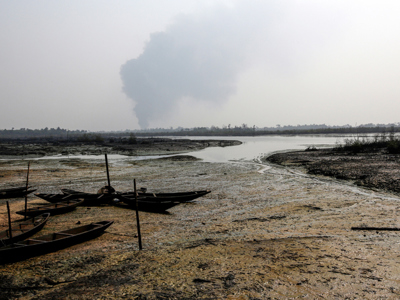
Pabai Pabai: Judgment in the landmark Torres Strait Island climate case
A recent judgment in the Australian Courts ruled against an effort by communities of the Torres Strait Islands to hold the Australian Government to account over harm caused by climate change. Pia Mitchell and Bianca Foo Dojan, here, consider the reasons for the judgment and the need for future legal action to address the effects of the climate emergency.
Posted on 29 August 2025
On 15 July 2025, the Australian Federal Court handed down a much-awaited judgment on a legal claim brought by two Torres Strait elders that the Australian Commonwealth Government had failed to protect their community from the risks of harm caused by climate change.
The ruling has contributed to a growing body of case law that tackles the question of whether a common law duty of care exists between governments and their people in relation to harms caused by climate change. The court’s conclusion that no such duty yet exists signals a pushback from the judiciary towards climate change related claims in the Australian federal jurisdiction.
The case
The Torres Strait is home to a number of low-lying islands that are particularly vulnerable to damage caused by climate change, not least as a result of rising sea levels. Representing their communities, elders Pabai Pabai and Guy Paul Kabai brought a historic representative case against the Australian Commonwealth Government, alleging failure to take reasonable steps to protect their communities from the impacts of climate change.
The claimants argued that the Commonwealth Government owed them a duty of care under the common law of negligence to take reasonable steps to protect the claimants from the risks of harm caused by climate change. They alleged that the Commonwealth Government had breached that duty of care in two ways:
- Failure to set greenhouse gas emissions targets in line with the best available science.
- Failure to adequately implement adaptive measures to prevent damage to property and to the traditional way of life practiced in the Torres Strait, known as Ailan Kastom
The climate impacts faced by the Torres Strait islands, as well as the rising sea levels leading to depletion of land, include coral bleaching resulting from warmer ocean temperatures, ocean acidification, and extreme weather causing destruction to the land.
Other impacts to the Ailan Kastom include the inundation of sacred burial sites, changes in wildlife migratory patterns which impact hunting and the increasing inability to engage in various cultural ceremonies.
The Commonwealth Government’s defence drew upon the recent case of Sharma v Minister for the Environment, in which the full Federal Court of Australia found that decisions in relation to climate change could not be challenged in court; rather, they should be policy decisions made by the government. The court in that case determined that the question of whether to introduce a novel duty of care in relation to harms caused by the climate emergency was ultimately a question for Parliament, and should not be resolved by the courts.
The judgment
After much anticipation, the Federal Court of Australia in Pabai Pabai found in favour of the Commonwealth Government. The court concluded that the common law of negligence as it currently stands is not a suitable mechanism through which communities, like those in the Torres Strait, could obtain effective relief, citing amongst others the following reasons:
- The Australian Government’s response to climate change, including the setting of targets and fulfilment of obligations under international treaties is a matter for Parliament, not the judiciary. The law of negligence as it presently stands does not allow for a common law duty of care in respect of matters of government policy, since the courts are unable to properly assess the reasonableness of any such decisions
- Further it determined that the loss of fulfilment of culture, such as Ailan Kastom, is not a recognised category of loss
Next steps
In the absence of legislative reform, other jurisdictions have seen the act of negligence emerge as a key legal avenue in climate litigation - as seen in Urgenda Foundation v. State of the Netherlands, where the Netherlands' Supreme Court recognised the Dutch government’s obligation to protect the right to life and private and family life from the real and foreseeable threat posed by climate change. While in this instance the court considered itself bound to reject the claimants’ case, Justice Wigney highlighted that there can be no doubt that the Torres Strait way of life is facing devastating impacts that are attributed to climate change and that the harm suffered reflected gaps in climate policy. Justice Wigney further remarked that legislation and the common law need to evolve in response to the growing threat of the impacts of climate change.
Pabai Pabai and Guy Paul Kabai have indicated their commitment to continue fighting. Despite the adverse judgment their case will hopefully generate ongoing momentum in Australia for further strategic litigation in this area. We can but hope that future courts will be prepared to establish accountability for government inaction in the face of the climate emergency, particularly in relation to traditional owners who find their connection to country and culture under heightened threat.

Pia Mitchell
Pia is an Australian qualified lawyer specialising in international group claims



